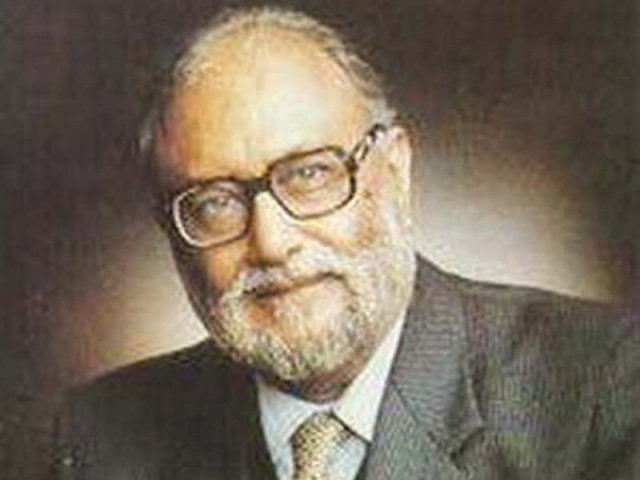World’s best physicist ‘relatively unknown’ in Pakistan
Top scholars pay glowing tributes to Nobel laureate at a seminar

PHOTO: EXPRESS
Some of the world’s top physicists and mathematicians paid glowing tributes to the Nobel laureate at a seminar at the Abdus Salam School of Mathematical Sciences (ASSMS) Government College University (GCU) Lahore on Saturday.
“Dr Salam should have also been given the Nobel Prize for Peace for outstanding efforts for the international science collaboration and development of scientific culture in the third world countries,” said Prof Dr Michael Duff from Imperial College London in his video message for the seminar. He also explained in detail the four big ideas of contemporary physics to which Dr Salam contributed heavily.
In his video address, International Centre for Theoretical Physics (ICTP) Italy, Director, Prof Fernando Quevedo said apart from the work on standard model, for which Dr Salam had been awarded the Nobel Prize, the list of his lasting contributions to theoretical physics was long and the impact was deep. He added Dr Salam had been the pioneer of the idea to go beyond the standard model of physics.
Cumrun Vafa, a professor of science at Harvard University, USA also sent a video message to pay tributes to Dr Salam. “Besides electroweak unification theory, establishment of ICTP is (Dr) Salam’s the biggest contribution to science,” he commented in his video message. He said the ICTP remains to this day a monument to Salam’s determination.
The speakers at the seminar also shared their profound memoires of working with Dr Salam at the seminar and also celebrated his 91st birthday. Addressing the seminar, Dr Jamil Aslam, a professor of Theoretical High Energy Physics at Quaid-i-Azam University, Islamabad, discussed the electroweak unification, the work for which Abdus Salam won the Noble prize together with Steven Weinberg and Sheldon Glashow.
Talking about Dr Salam’s scientific work, Dr Amer Iqbal, a professor of physics and mathematics, explained the mathematics behind symmetry and symmetry breaking which allows particles to get masses.
Dr Rizwan Khalid, a professor of physics at NUST, discussed the idea of grand unification which unifies the strong nuclear with electroweak force. Dr Babar Qureshi, a PhD in theoretical physics, explained super-symmetry which relates bosons and fermions and the idea of super-space introduced by Dr Salam.
The speakers also said that Dr Salam’s achievements were not confined to the Nobel Prize alone. At the age of 33, he became Fellow of the Royal Society London. He was the first person from a Muslim country to achieve that distinction.
At the age of 38, Dr Salam became the director of the International Centre for Theoretical Physics (ICTP) Trieste, Italy. For his contributions towards peace and promotion of International Science Collaboration, Dr Salam got the Atoms for Peace Medal and Award.
He became fellow and member of more than 30 academies/societies of the world and was awarded DSc Honoris Causa by more than 40 universities of the world. There is a long list of his achievements, honours and awards.
Published in The Express Tribune, February 5th, 2017.



















COMMENTS
Comments are moderated and generally will be posted if they are on-topic and not abusive.
For more information, please see our Comments FAQ